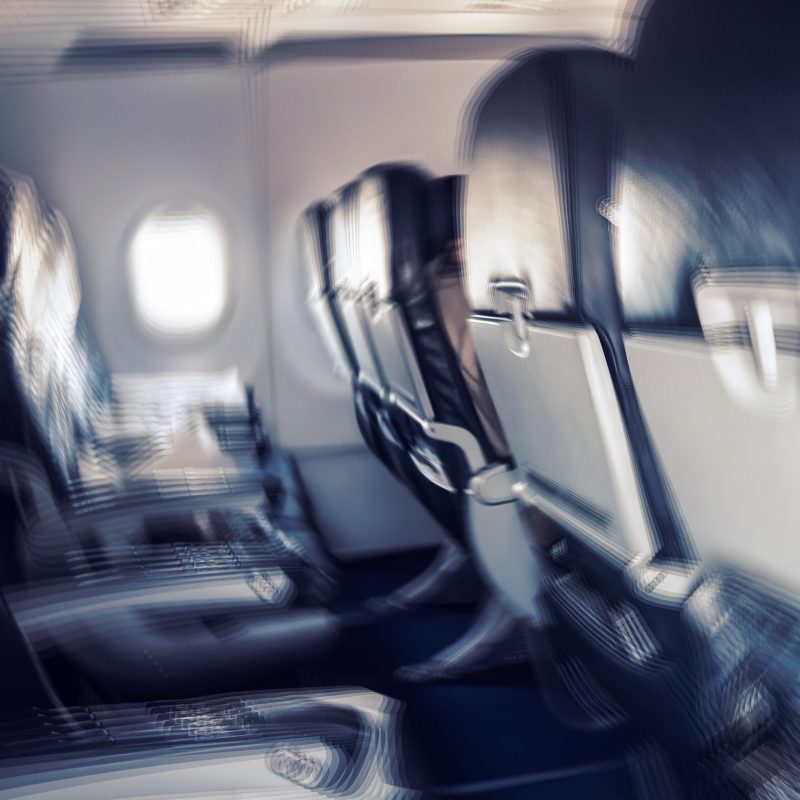
Aviophobia, otherwise known as the fear of flying, affects 6.5% of the population, or approximately 20 million people, according to the National Institute of Mental Health. For those affected, this means sweaty palms, a racing heart rate, an increase in blood pressure, or even panic attacks while on board or before take off.
Videos by TravelAwaits
Though it may seem impossible to overcome the fear of flying, we’ve outlined some tested techniques below to help those who suffer from flight anxiety.
1. Choose your seat wisely
If you’re prone to flight anxiety, make sure to choose your seat wisely. Determine whether you feel most comfortable in the aisle, middle, or window seat.
Sitting toward the front of the plane is another great method for decreasing flight anxiety. Kevin Kelly, a senior captain with a major U.S. airline, explains that sitting toward the front of the plane normally results in a much smoother and quieter ride.
If your piggy bank will allow it, upgrade to First Class. Many first class flights include a variety of amenities, including goose down duvet blankets, recliner seats, and entertainment. According to Travel + Leisure, feeling physically comfortable will make achieving emotional comfort that much easier.
2. Don’t let turbulence frighten you
Turbulence may be one of the most frightening and alarming factors for those with flight anxiety when, in reality, it’s nothing more than a simple (and very common) change in the movement of air.
Keith Tonkin, former military pilot and director of consultancy group Aviation Projects told VICE about airplanes: “Modern planes are designed to withstand far more force than turbulence can create. They’re simply not going to fall apart.”
If you can think about turbulence the way Tonkin explains it, you can hopefully come to realize that planes are specifically built to withstand turbulence, and there really isn’t any amount of it that can overpower a 90,000-pound aircraft.
3. Reprogram your mind
As humans, we have a tendency to uphold irrational fears. Every day, we step into our vehicles and drive ourselves to and from work without thinking twice, yet we constantly fear flying in planes.
According to the National Safety Council, U.S. vehicle deaths topped 40,000 in 2017. In the same year, airlines recorded zero accident deaths in commercial passenger jets, making it the safest year on record for commercial passenger air travel.
If you struggle with flight anxiety, try to remind yourself that not one single person died in a commercial passenger jet last year. This will hopefully be able to reduce at least some of your fears.

4. Have relaxation remedies on hand
We don’t want to sit here and tell you to medicate heavily before a flight, but a prescription from a licensed physician for fast-acting anxiety medications can greatly reduce discomfort for anxious flyers. Keep in mind, though, that all bodies react differently to different medications, and they might not be guaranteed to help.
Another alternative to prescriptions is herbal remedies such as St. John’s Wort or Scullcap to reduce nerves. Something as simple as a sleepy-time tea could also help reduce anxiety and cause drowsiness, allowing worried flyers the opportunity to rest easy during a flight.
With all the talk about medications and herbal remedies, we’d like to point out that you should probably avoid the temptation to drink alcohol or coffee during a flight. Though we tend to believe that alcohol helps our bodies to relax, it actually tends to increase anxiety levels. It also causes dehydration and headaches. Similarly, caffeine is known for spiking anxiety levels.
Click here to learn more about how alcohol and caffeine can make your nervous states even worse.
5. Bring distractions with you
Bringing as many distractions with you as possible will inevitably reduce stress levels. Create a new playlist on your iPod for your upcoming flight, bring your laptop and some DVDs, throw some playing cards in your carry-on, or download your favorite podcasts. You can even carry a photo of your destination with you to remind you of the incredible adventure you’re about to embark on!
Budget Travel claims one of the best ways to distract yourself is to bring a book or download a television show that you’ve started at home and are already deeply invested in.
According to Todd Farchione, Ph.D., of Boston University’s Center for Anxiety & Related Disorders, “If people associate televisions with being safe at home, and there’s a television on the plane, they will feel similar familiar feelings of comfort.”
6. Just breathe
Alexia Touboul, LMHC, Clinical Director at Banyan Treatment Center, suggests trying relaxation and breathing techniques before, during, or after a flight.
“My favorite is the 5-3-5 breathing method; breathe in for 5 seconds, hold for 3, breathe out for 5 seconds and repeat until feeling calmer,” Touboul says.
Trying this or other breathing techniques can greatly help reduce anxiety for those who struggle during flights.
Though we understand overcoming flight anxiety is a grueling and unsettling task, we hope these methods will help you to conquer flight anxiety and result in an overall more enjoyable travel experience.

